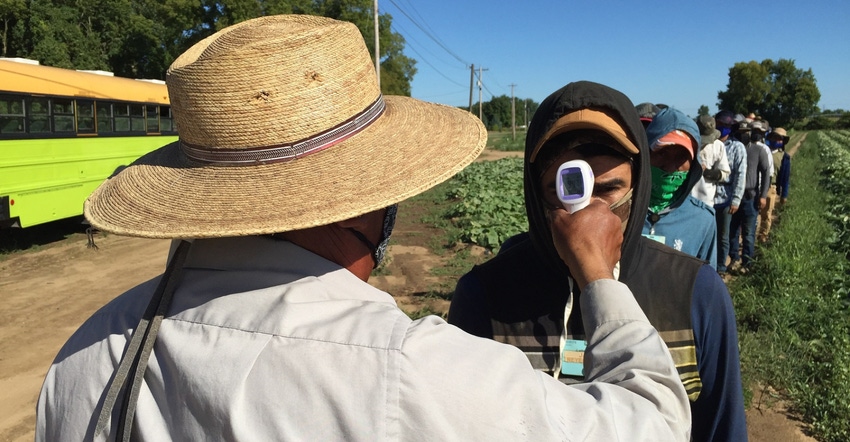Mandatory farmworker COVID testing requirements challenged
Emergency order requires farm employers with more than 20 farmworkers to mandate COVID-19 testing.
August 13, 2020

An emergency order issued by the Michigan Department of Health and Human Services on Aug. 3 mandating COVID-19 testing by farm employers with 20 or more farmworkers is headed to court.
Grand Rapids-based Varnum LLP formally filed motions on Tuesday in Western District Federal Court on behalf of individuals affected by the testing mandate, including farmworkers and farm employers seeking an injunction to the MDHHS emergency order, which they argue is a violation of their civil rights. According to the filing, the order targets two classes of workers for mandatory testing and subsequent enforcement — migrant and seasonal workers and workers in the meat, poultry, egg processing, and greenhouse industries.
Migrant Legal Aid, a nonprofit organization that has been advocating for migrant workers’ rights since 1973, and the Michigan Farm Bureau, the state’s largest general farm organization, both support the legal challenge of the emergency order as a violation of the Latino community’s civil rights.
According to Michigan Farm Bureau Assistant General Counsel Allison Eicher, there's no question that the MDHHS emergency order is targeting a class of individuals who also happen to make up the largest class of farmworkers in the state, without regard to COVID-19 symptoms.
“The order clearly targets the Latino community, and the state has been really clear that they’ve singled out this minority class,” Eicher said. “No other group in the state is subject to mandatory testing for work except for nursing home workers.”
But even then, she said there's a significant difference.
“If the nursing home worker chooses not to be tested, they still get to go to work; they just can't interact with patients,” Eicher said. “If a farmworker chooses not to be tested, they don't get to work until they can provide a negative test. That's what is so shocking to the industry — it's just a blatant targeting of migrant farmworkers.”
According to Eicher, producers and farmworkers have also questioned the unrealistic timetable for implementation, which required farm employers to develop a “Compliance Plan” by Aug. 10, with all mandated testing to be completed by Aug. 24.
“Our concerns are that this singles out a particular population – that is politically disenfranchised, financially vulnerable, and almost exclusively minority – and threatens their livelihood (The Michigan Department of Civil Rights estimates that 99.6% of farmworkers are Hispanic in origin). This is not the only way to protect this population – we could incentivize testing (rather than punishing those who don’t get tested), or the state could meaningfully enforce the existing protective requirements,” said Benjamin O’Hearn, attorney at Migrant Legal Aid.
He added, “But the fundamental principle guiding our actions is that our clients feel that this is unfairly targeting them, and they have a right to challenge this action. They have a right to be heard, and we support giving them a forum to speak.”
In the effort to claim bragging rights as the “national leader” in COVID-19 protections of migrant and ag workers, Eicher said the MDHHS emergency order is ignoring two basic realities — farmer compliance efforts above and beyond previously issued executive orders, and that most farm operations have family members directly involved with migrant farmworkers daily.
“Farmers are doing their absolute best to manage their business through this crisis, while also placing the highest priority on the health and safety of their employees which typically includes members of their own family, taking extraordinary measures to insulate them from the risks of exposure to COVID-19,” Eicher said.
“Ordering a small group of people to be tested, especially a minority group, and not ordering any other group of people to be tested, raises serious discrimination and equal protection concerns,” Eicher continued.
Even though the MDHHS order is an emergency order — issued by MDHHS Director Robert Gordon — not an executive order issued by Gov. Whitmer, Eicher said the MDHHS mandate relies on the authority of previously issued emergency orders.
“It’s a distinction without a difference,” Eicher added. “(MDHHS) cites a lot of the same authority as a public health emergency, but they rely on Gov. Whitmer’s executive orders to implement the emergency order’s testing mandate.”
Even though the MDHHS emergency order is now facing a legal challenge, the state does expect compliance with this order, according to Eicher, including the required Compliance Plan.
Plaintiffs in the complaint requested that the Court, “on an expedited basis, enter judgment in their favor and against Governor Gretchen Whitmer, Director Robert Gordon, and Director Gary McDowell,” as follows:
Declaring Gordon's order violates the Equal Protection Clause of the 14th Amendment of the United States Constitution.
Temporarily, preliminarily, and permanently enjoining and restraining Whitmer, Gordon, McDowell and any other person acting under the authority of the governor and directors from enforcing the Order and/or the FAQs as outlined in this Complaint, including but not limited to the Order's mandate for all covered workers to take a COVID-19 test;
Declaring Gordon exceeded the scope of his statutory authority under MCL 333.2253 in issuing the Order, and mandating individuals take medical tests.
You May Also Like



